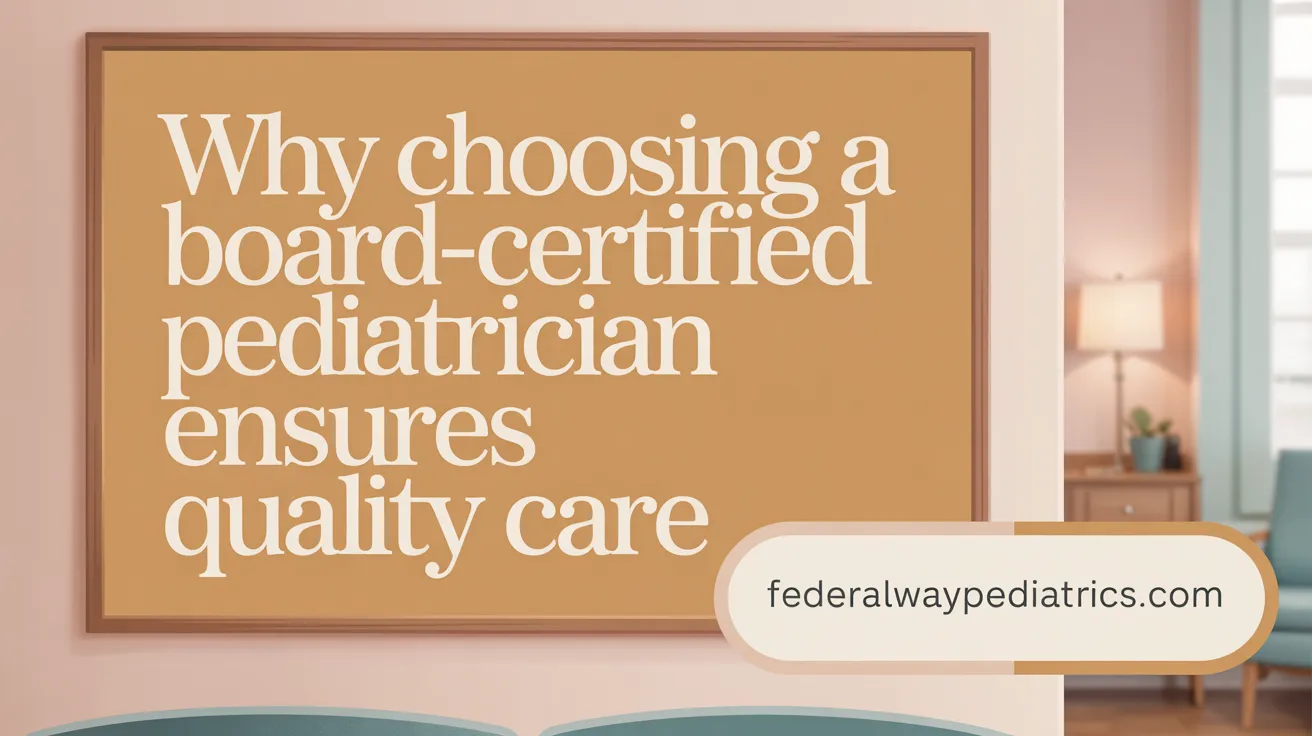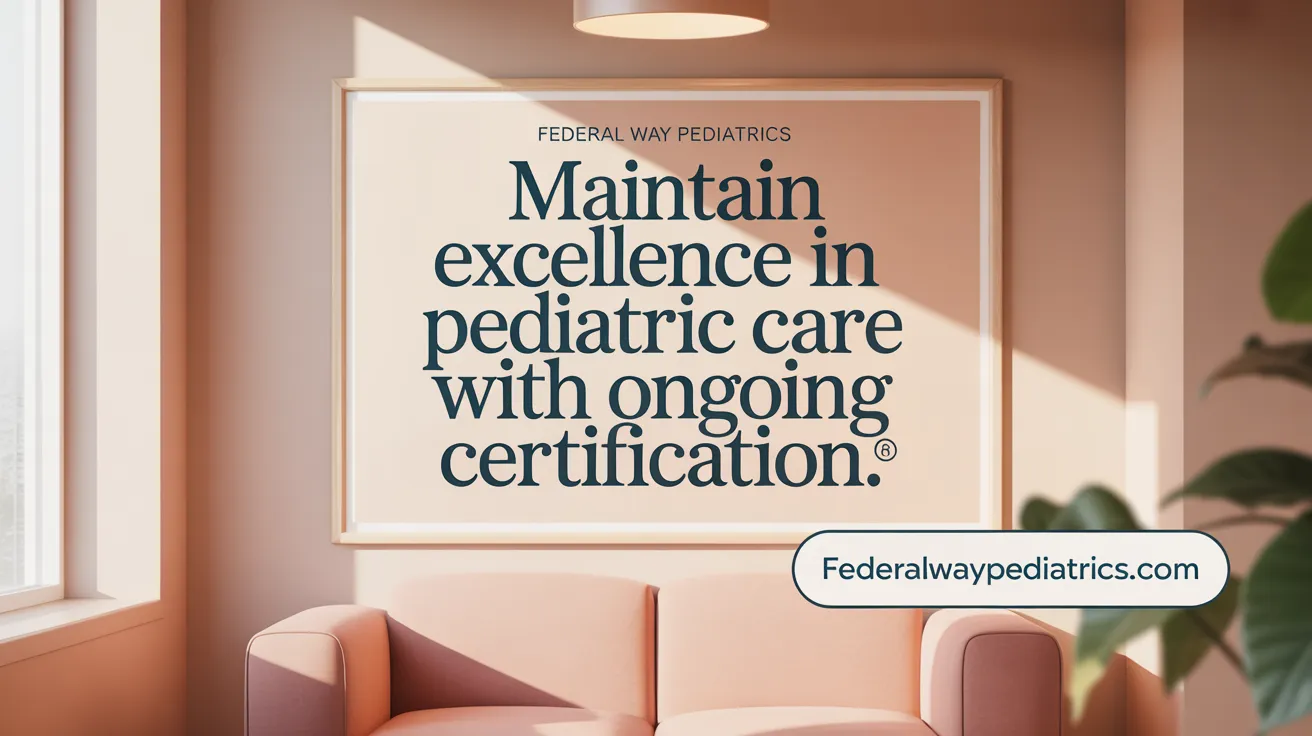Understanding Board Certification in Pediatric Medicine
What is Pediatric Board Certification?
Board certification in pediatrics is a voluntary credential that pediatricians earn to demonstrate their specialized knowledge and commitment to delivering high-quality care for children. Unlike state licensing, which permits a physician to practice medicine, board certification goes beyond these legal requirements. It signifies that a pediatrician has met rigorous standards, including extensive education, training, and continual learning.
Training and Examination Process
To become board-certified, pediatricians must complete medical school followed by a three-year accredited pediatrics residency program. They then pass a comprehensive exam administered by the American Board of Pediatrics (ABP), assessing their expertise in all aspects of child health.
Beyond initial certification, pediatricians maintain their credential by engaging in ongoing professional development through Maintenance of Certification (MOC). This process, which includes periodic assessments and education, ensures pediatricians stay current with advances in pediatric medicine.
Importance of Board Certification
Choosing a board-certified pediatrician ensures your child receives care from a professional who is extensively trained and committed to continual improvement and safety in healthcare. This reflects a dedication not only to clinical competence but also to addressing the physical, emotional, and social well-being of children throughout their development.
The Rigorous Path to Becoming a Board-Certified Pediatrician

What is pediatrician board certification and how does it differ from medical licensing?
Board certification in pediatrics is a voluntary credential that surpasses state medical licensing requirements. While a medical license allows a physician to practice medicine legally, board certification by the American Board of Pediatrics (ABP) demonstrates a pediatrician’s specialized expertise and commitment to providing high-quality care for children.
Educational prerequisites
To become board-certified, a pediatrician must first graduate from an accredited medical school. This foundational education prepares physicians with the general medical knowledge needed before specializing in pediatrics.
Residency and subspecialty training
After medical school, aspiring pediatricians complete a three-year accredited residency program focused on pediatric medicine. For those pursuing subspecialty areas, such as pediatric cardiology certification, additional fellowship training in an ACGME-accredited program typically lasts three years. This advanced training emphasizes clinical competence in managing complex pediatric conditions.
Comprehensive exams and certification process
Certification by the ABP requires passing a rigorous comprehensive exam that evaluates both general pediatric knowledge and subspecialty expertise when applicable. Candidates must also demonstrate professionalism, clinical competence, and maintain an active medical license. Subspecialists pass additional specialized exams to earn certification in fields like pediatric cardiology.
Maintenance of Certification (MOC) and continuing education
Since 1988, ABP board certifications are time-limited and require periodic renewal through Maintenance of Certification (MOC). The MOC process involves ongoing education, self-assessment, and participation in quality improvement activities in pediatric care. This continuous professional development ensures pediatricians remain current with evolving medical standards and best practices, providing safe and effective care.
This rigorous pathway ensures that board-certified pediatricians, including subspecialists, uphold high standards of knowledge and professionalism to meet the unique healthcare needs of infants, children, and adolescents.
Why Board Certification Matters for Quality Pediatric Care

Ensuring Expertise and Up-to-Date Knowledge
Board-certified pediatricians have completed rigorous training that exceeds state licensing requirements. This includes medical school, a three-year accredited pediatric residency, and passing a comprehensive certification exam by the role of American Board of Pediatrics (ABP). They maintain their expertise through ongoing education and recertification, staying current with the latest medical advances, guidelines, and treatments relevant to children’s health.
Enhancing Patient Safety and Care Quality
Certification standards promote high-quality healthcare by requiring pediatricians to demonstrate clinical competence and professionalism. Pediatricians with board certification engage in continuous quality improvement activities in pediatric care and lifelong learning, directly contributing to safer, more effective care for infants, children, and adolescents.
Professionalism and Commitment to Lifelong Learning
Board certification is not a one-time achievement but an ongoing commitment involving Maintenance of Certification (MOC). This process includes self-assessment, education, and periodic exams to ensure pediatricians continually enhance their skills and knowledge. This commitment to lifelong learning benefits patients, as it supports the highest standards of pediatric care.
Parent Confidence and Trust in Care Providers
Choosing a board-certified pediatrician gives parents assurance that their child’s doctor possesses validated expertise and adheres to stringent professional and ethical standards. Parents can trust that board-certified pediatricians understand the specialized medical needs of children, addressing physical, emotional, and social health comprehensively. This foundation of trust supports strong, long-term relationships that are essential for managing children’s ongoing healthcare needs.
Why is it important to choose a board-certified pediatrician?
Board-certified pediatricians demonstrate a commitment to ongoing education, meeting higher standards than state licensing, which results in expert and reliable care. Certification promotes patient safety, comprehensive knowledge of child health, and professional accountability, providing parents confidence in their child's medical care.
Specialized Care in Pediatric Subspecialties: Focus on Pediatric Cardiology

What is the significance of board certification in pediatric subspecialties such as pediatric cardiology?
Board certification in pediatric subspecialties, including pediatric cardiology certification, represents an advanced level of professional expertise beyond general pediatrics. Achieving certification requires completion of a rigorous fellowship — typically three years full-time in an ACGME-accredited program — and passing specialized exams. This process verifies a pediatric cardiologist’s competence in diagnosing, managing, and treating complex cardiovascular conditions in infants, children, and adolescents.
Subspecialty training and certification process
Pediatric cardiologists undergo extensive specialized training after completing general pediatrics residency. This includes learning to manage congenital heart defects, arrhythmias, cardiomyopathy, and other cardiovascular disorders. Certification by the American Board of Pediatrics (ABP) confirms that a physician has met strict standards, including clinical competence, professionalism, and scholarly activity. Maintenance of Certification (MOC) ensures ongoing development and quality improvement throughout their career.
Scope of pediatric cardiology practice
Pediatric cardiology covers a broad range of heart-related issues from infancy through young adulthood. Specialists evaluate and treat congenital and acquired heart diseases, perform diagnostic testing, and collaborate with surgeons and other specialists when intervention is necessary. They manage diverse conditions like heart murmurs, hypertension, and heart rhythm abnormalities, offering comprehensive care tailored to children’s unique developmental needs.
Importance of subspecialty certification in managing complex conditions
Subspecialty certification in pediatric cardiology assures families and healthcare providers of the pediatrician’s deep expertise. It guarantees that the provider is equipped to handle highly specialized cases, improving diagnostic accuracy, treatment effectiveness, and long-term health outcomes. In locations such as Federal Way, Washington, access to board-certified pediatric cardiologists is essential for delivering expert, personalized care to children with cardiovascular conditions.
Impact on patient outcomes and family support
Pediatric cardiologists not only deliver medical care but also provide emotional support and guidance to families navigating heart diagnoses and treatments. Their comprehensive training includes addressing physical, emotional, and social aspects of health. This holistic approach enhances patient safety, therapy adherence, and overall quality of life for children with heart conditions.
| Topic | Details | Importance |
|---|---|---|
| Training | 3-year accredited fellowship, clinical competence, exam | Ensures expert knowledge in pediatric cardiology |
| Practice scope | Diagnosis & management of congenital and acquired heart diseases | Wide range of conditions covered for comprehensive care |
| Certification significance | Validates specialized skills, requires continuous learning | Assures quality care and professional excellence |
| Patient and family impact | Holistic care approach including emotional support | Enhances outcomes and supports family wellbeing |
Maintenance of Certification: Ensuring Pediatricians Stay Current and Competent

What is Maintenance of Certification (MOC) and why is it important?
Maintenance of Certification (MOC) is a continuous professional development process that board-certified pediatricians undertake to maintain their credentials. It involves lifelong learning, self-assessment, and participation in quality improvement activities in pediatric care. This ongoing engagement ensures that pediatricians keep pace with the latest medical advances and evolving best practices, which directly contributes to safer and more effective patient care.
Purpose and components of Maintenance of Certification (MOC)
MOC is designed to foster continual growth in knowledge and clinical skills. It includes focused learning, self-assessment modules, and quality improvement projects aimed at enhancing a pediatrician’s diagnostic and treatment capabilities. By participating in these activities, pediatricians reaffirm their clinical competence and commitment to excellence in pediatric healthcare.
Ongoing medical knowledge assessment and quality improvement
Periodic evaluations and self-assessments embedded in MOC allow pediatricians to identify knowledge gaps and update their expertise regularly. In turn, quality improvement initiatives help refine clinical practices, ensuring that care delivery aligns with evidence-based guidelines and improves impact of board certification on patient outcomes.
Recognition by healthcare organizations and insurers
MOC participation is recognized by hospitals, insurers, and credentialing bodies as a demonstration of a pediatrician’s dedication to maintaining high professional standards. This recognition offers assurance to families and healthcare providers that the pediatrician meets rigorous criteria of competence and professionalism outlined by the role of American Board of Pediatrics (ABP).
Impact of MOC on patient care outcomes
Research supports a positive link between MOC engagement and improved care processes and outcomes. Families benefit from knowing their pediatrician actively maintains current knowledge and skills, facilitating better diagnosis, treatment, and overall management of their child’s health.
Through MOC, board-certified pediatricians continually enhance their ability to provide expert, up-to-date care, which is essential to safeguarding children's health and wellbeing.
The Impact of Board Certification on Pediatric Healthcare in Federal Way, Washington
Role of Locally Accessible Board-Certified Pediatricians
Families in Federal Way, Washington benefit from access to board-certified pediatricians who have met rigorous national certification standards set by the American Board of Pediatrics (ABP). This ensures children receive expert, reliable care from physicians who have undergone extensive training, passed comprehensive examinations, and engage in continuous professional development.
Integration of National Standards with Regional Healthcare Needs
Board-certified pediatricians in Federal Way not only uphold national excellence in pediatric care but also tailor their services to the specific health needs of their community. Their dedication to lifelong learning for pediatricians and quality improvement activities in pediatric care ensures that updates in medical guidelines and regional healthcare resources are integrated into the care provided locally.
Enhanced Specialized Care Including Pediatric Cardiology
Beyond general pediatrics, Federal Way's pediatric healthcare includes specialists certified in critical subspecialties such as pediatric cardiology. These board-certified cardiologists are trained extensively through fellowships and maintain certification to expertly manage complex heart conditions in children, including congenital heart disease.
Building Trust Through Personalized, Comprehensive Care
Board certification signals a pediatrician's commitment to comprehensive care, addressing physical, emotional, and social health aspects throughout childhood. Families can trust that pediatricians in Federal Way prioritize long-term relationships and personalized treatment plans, supported by ongoing education and adherence to high standards for pediatricians, to ensure the best outcomes for their children.
Board Certification: A Cornerstone of Trust and Excellence in Pediatric Care
Understanding Board Certification Benefits
Board certification in pediatrics is a voluntary process that exceeds basic medical licensing. It demonstrates a pediatrician's commitment to ongoing professional growth, ensuring expertise in child health, from routine care to complex conditions.
Specialized Pediatric Care
Certified pediatricians undergo rigorous training, including medical school, pediatric residency, and often subspecialty fellowships, such as pediatric cardiology. This specialized knowledge equips them to deliver comprehensive care tailored to children's unique developmental needs.
Guidance for Parents
Choosing a board-certified pediatrician guarantees that your child receives care rooted in current medical standards and best practices. It provides peace of mind knowing your child’s healthcare provider is dedicated to safety, quality, and continuous learning.
Parents seeking expert and compassionate pediatric care should prioritize board-certified providers to support their child's health at every stage.
